GEOGRAFÍA. (MUÑOZ-DELGADO Y MÉRIDA, Mª CONCEPCIÓN)
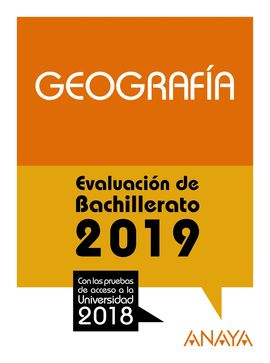
GRIEGO. (NAVARRO GONZÁLEZ, JOSÉ LUIS / RODRÍGUEZ JIMÉNEZ, JOSÉ MARÍA)
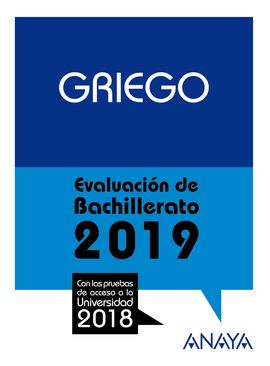
MATEMÁTICAS II. (BUSTO CABALLERO, ANA ISABEL / DÍAZ ORTEGA, ANA MARÍA)
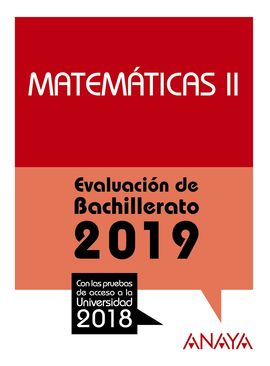
MATEMÁTICAS APLICADAS A LAS CIENCIAS SOCIALES II. (BUSTO CABALLERO, ANA ISABEL / DÍAZ ORTEGA, ANA MARÍA)
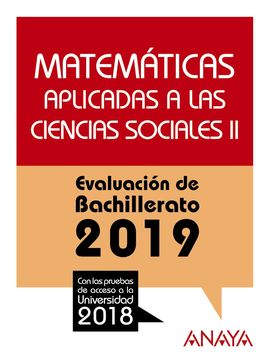
QUÍMICA. (FERNÁNDEZ FEAL, FRANCISCA ESTER)
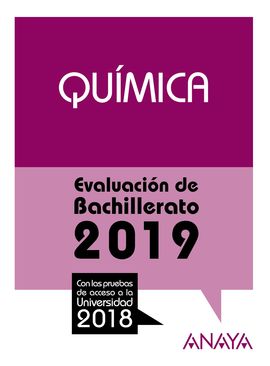
CAPACIDAD PROFESIONAL DOCENTE. BUSCANDO LA ESCUELA DE NUESTRO TIEMPO. (LUENGO HORCAJO, FLORENCIO / MOYA OTERO, JOSÉ)
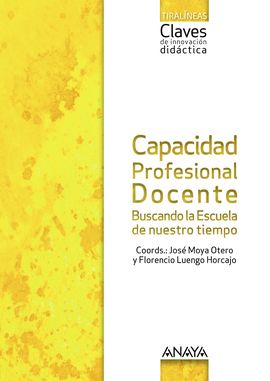
QUÍMICA INORGÁNICA . NOMENCLATURA Y FORMULACIÓN (LATORRE ARIÑO, MARINO)
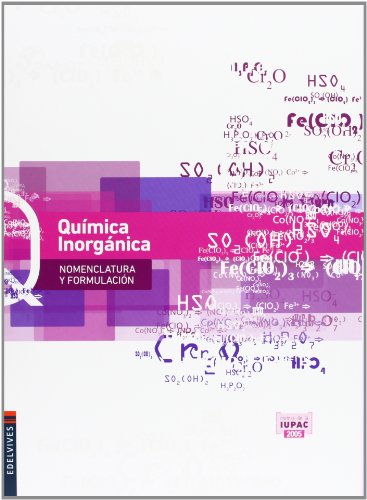
QUÍMICA. (ZUBIAURRE CORTÉS, SABINO / ARSUAGA FERRERAS, JESÚS MARÍA / GARZÓN SÁNCHEZ, BENITO)
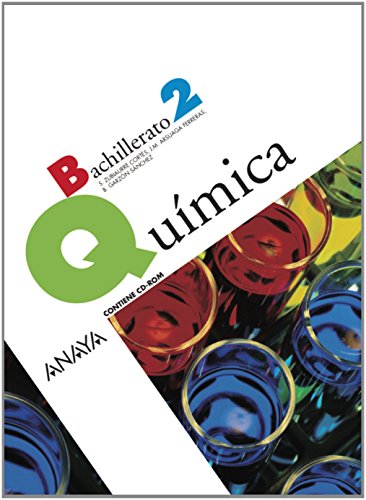
MATEMÁTICA DISCRETA. (CIRRE TORRES, FRANCISCO JAVIER)
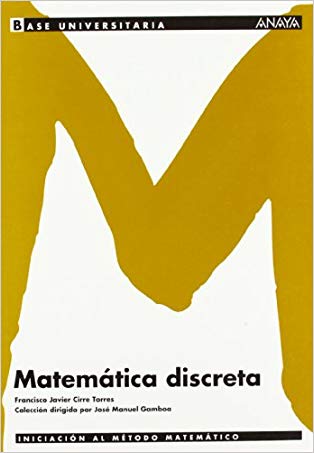
UNA UNIVERSIDAD PARA NIÑOS, 2 . OCHO CIENTÍFICOS EXPLICAN A LOS NIÑOS LOS GRANDES ENIGMAS DEL MUNDO (JANSSEN, ULRICH / STEUERNAGEL, ULLA)
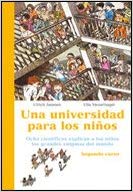 ¿Por qué crecen las plantas? ¿Por qué soñamos? ¿Por qué podemos oír? ¿Por qué no es bueno clonar a los seres humanos? ¿Por qué hay tantas cosas prohibidas para los niños? ¿Por qué están desnudas las estatuas griegas? ¿Por qué yo soy Yo? ¿Por qué las estrellas no se caen del cielo? Tras el éxito del primer curso de esta Universidad para los niños, presentamos ahora este segundo curso realizado a partir de otras ocho preguntas que abordan, esta vez, cuestiones de ética, arte, psicología, anatomía, botánica y astronomía y que, como en el primer curso, fueron contestadas por ocho profesores especializados de una forma ágil, divertida e inteligente. Este es un libro extraordinariamente divertido y aleccionador que muchos mayores harían bien en leer.
¿Por qué crecen las plantas? ¿Por qué soñamos? ¿Por qué podemos oír? ¿Por qué no es bueno clonar a los seres humanos? ¿Por qué hay tantas cosas prohibidas para los niños? ¿Por qué están desnudas las estatuas griegas? ¿Por qué yo soy Yo? ¿Por qué las estrellas no se caen del cielo? Tras el éxito del primer curso de esta Universidad para los niños, presentamos ahora este segundo curso realizado a partir de otras ocho preguntas que abordan, esta vez, cuestiones de ética, arte, psicología, anatomía, botánica y astronomía y que, como en el primer curso, fueron contestadas por ocho profesores especializados de una forma ágil, divertida e inteligente. Este es un libro extraordinariamente divertido y aleccionador que muchos mayores harían bien en leer.PASSWORD READER: ROB ROY (SCOTT, WALTER)
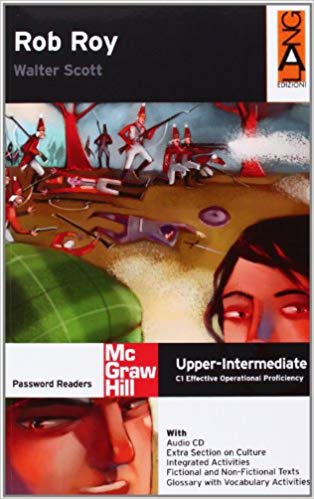 The perfect tenses – bothpresent and past – areexplained and usedprominently in most of thesereaders. Many introduce thepassive voice, and most featurethe future tense. Nearly all ofthem also include exercises todevelop understanding of thefirst conditional, and someinclude instruction in all threeconditional forms. More modalverbs and more complex verbalconstructions – using gerundsand infinitives – are presented.There is a generally higher levelof vocabulary, sometimes quitesophisticated.
The perfect tenses – bothpresent and past – areexplained and usedprominently in most of thesereaders. Many introduce thepassive voice, and most featurethe future tense. Nearly all ofthem also include exercises todevelop understanding of thefirst conditional, and someinclude instruction in all threeconditional forms. More modalverbs and more complex verbalconstructions – using gerundsand infinitives – are presented.There is a generally higher levelof vocabulary, sometimes quitesophisticated.These readers focus on topicsand vocabulary specific tocontemporary professions:television production, fashiondesign and computerisedbanking. Businessprocedures and moderntelecommunicationsare central to these stories.Also, these readers use anUpper Intermediate complexityof verb tenses and othergrammatical constructions.
EL COMENTARIO DE TEXTOS LITERARIOS (BELLO, FÉLIX)
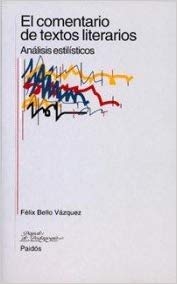 Pese a las dificultades que entraña, el autor establece en este libro un método que permite sintetizar las diferentes perspectivas de caracterización formal de los textos más diversos. Se trata de una obra de estilística práctica cuya finalidad es adquirir una técnica del estudio del estilo, eficaz y segura, con el fin de proceder a las operaciones esenciales del comentario de textos. Para asegurar mejor la eficacia fue necesario establecer, en la primera parte, las diferentes técnicas del análisis estilístico. La segunda parte, en cambio, traza el trayecto que va de la teoría a la práctica rigurosa: la descripción del dispositivo expresivo de once textos fundamentales pertenecientes a distintas épocas y a distintos géneros. Desde el primer capítulo, el autor procura seguir un esquema común, que comprende las siguientes etapas: la identificación del texto, el comentario semántico, el comentario morfosintáctico y el comentario prosódico. Este método, expuesto y aplicado sistemáticamente en los textos seleccionados, pretende ser útil a los estudiantes, ayudándoles a abordar con lucidez y rigor la práctica del comentario de textos.
Pese a las dificultades que entraña, el autor establece en este libro un método que permite sintetizar las diferentes perspectivas de caracterización formal de los textos más diversos. Se trata de una obra de estilística práctica cuya finalidad es adquirir una técnica del estudio del estilo, eficaz y segura, con el fin de proceder a las operaciones esenciales del comentario de textos. Para asegurar mejor la eficacia fue necesario establecer, en la primera parte, las diferentes técnicas del análisis estilístico. La segunda parte, en cambio, traza el trayecto que va de la teoría a la práctica rigurosa: la descripción del dispositivo expresivo de once textos fundamentales pertenecientes a distintas épocas y a distintos géneros. Desde el primer capítulo, el autor procura seguir un esquema común, que comprende las siguientes etapas: la identificación del texto, el comentario semántico, el comentario morfosintáctico y el comentario prosódico. Este método, expuesto y aplicado sistemáticamente en los textos seleccionados, pretende ser útil a los estudiantes, ayudándoles a abordar con lucidez y rigor la práctica del comentario de textos.DICCIONARIO DE DUDAS (DE LUCAS, CARMEN)
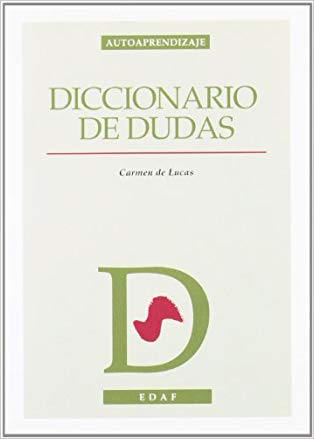 Es indudable que el grado de cultura de una sociedad está en relación al uso correcto del más habitual instrumento de comunicación: el lenguaje. Esta obra servirá de ayuda a la hora de resolver dudas o problemas que plantea el español a sus hablantes y a todos aquellos que desean profundizar en el conocimiento de la lengua española, en especial a los alumnos de la enseñanza media.
Es indudable que el grado de cultura de una sociedad está en relación al uso correcto del más habitual instrumento de comunicación: el lenguaje. Esta obra servirá de ayuda a la hora de resolver dudas o problemas que plantea el español a sus hablantes y a todos aquellos que desean profundizar en el conocimiento de la lengua española, en especial a los alumnos de la enseñanza media.¡ESTE POLLO ES UN TIRANOSAURIO!(VVKIDS) (ILUSTRACIONES DE R.GARCÍA MORA)
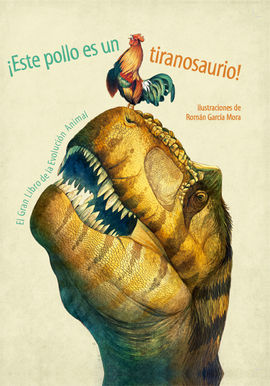 Un libro perfecto para que los más jóvenes entiendan fácilmente cómo han cambiado a lo largo de miles de años los animales que habitan nuestro planeta. Aprenderán cómo se ha desarrollado la trompa de los elefantes o como podemos afirmar que ¡los gallos son en realidad un tiranosaurio!
Un libro perfecto para que los más jóvenes entiendan fácilmente cómo han cambiado a lo largo de miles de años los animales que habitan nuestro planeta. Aprenderán cómo se ha desarrollado la trompa de los elefantes o como podemos afirmar que ¡los gallos son en realidad un tiranosaurio!